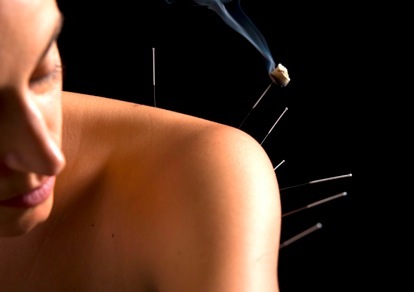WHAT CAN ACUPUNCTURE TREAT?
Cheshire Acupuncture Clinic
CHESHIRE ACUPUNCTURE CLINIC
Tranquility, Harmony & Well-Being



FAQs
In 2009 the National Institute for Health and Clinical Excellence recommended that acupuncture should be made available on the NHS, as a cost-effective short-term treatment for the management of early, persistent non-specific lower back pain.
There is reasonably good evidence that acupuncture is also an effective treatment for:
-
 Dental Pain
Dental Pain -
 Osteoarthritis knee pain (as temporary adjunctive treatment)
Osteoarthritis knee pain (as temporary adjunctive treatment) -
 Pain and discomfort during gastrointestinal endoscopy
Pain and discomfort during gastrointestinal endoscopy -
 Short term relief of tension-type headache
Short term relief of tension-type headache -
 Nausea and vomiting after an operation
Nausea and vomiting after an operation -
 Pain and discomfort during oocyte retrieval ( a procedure used during IVF)
Pain and discomfort during oocyte retrieval ( a procedure used during IVF) -
 Overall feeling of well-being and relaxed
Overall feeling of well-being and relaxed
DOES ACUPUNCTURE WORK?
Acupuncture originated in China where it still features in mainstream healthcare, both as a stand-alone therapy and in combination with conventional western medicine. Acupuncture is now widely used and accepted all over the world. In the UK more and more people are finding out what acupuncture can do for them.
WHAT CAN IT DO FOR ME?
Some people turn to acupuncture for help with a specific symptoms or to relieve specific pains like osteoarthritis of the knee. Some use acupuncture because they feel generally unwell but have no obvious diagnosis. Others choose to have treatment to help maintain good health, as a preventive measure, or simply to improve their general sense of wellbeing. Because traditional acupuncture aims to treat the whole person rather than specific symptoms in isolation, it can be effective for a range of conditions. Acupuncture is considered suitable for all ages including babies and children. It can be used effectively alongside conventional medicine. Remember that acupuncturists treat the person, not just the condition which they have, so each patient’s treatment plan will be different. However, you can always ask your practitioner about other patients’ experiences, to give you an idea of what to expect. Many people return to acupuncture again and again because they find it so beneficial and relaxing.
WHAT HAPPENS WHEN I GO FOR TREATMENT?
The acupuncturist will use a number of different diagnostic methods to get a complete picture of your health and lifestyle, including taking a full medical history, reading your pulses, and looking at your tongue. Based on this information, the acupuncturist makes a diagnosis and puts together your personal treatment plan. Acupuncture points are selected according to your symptoms as well as your underlying energy pattern. The single-use sterile needles come in sealed packs: they should be opened in front of you and are safely disposed of after each treatment.
WHAT DOES IT FEEL LIKE?
Acupuncture needles are very fine, just like a human hair; 6-7 of them can fit into the head of a hypodermic needle. When the needle is inserted, the sensation is often described as a tingling, warm sensation or dull ache. In fact, acupuncture is a very relaxing treatment, patients commonly fall asleep during the treatment.
IS IT SAFE?
The results of two independent surveys published in the British Medical Journal in 2001 (MacPherson et al, White et al, both BMJ September 2001) concluded that the risk of serious adverse reaction to acupuncture is less than 1 in 10,000. The needles used are single-use, sterile, and disposable. Responses to treatment can sometimes include tiredness or mild dizziness, and very occasionally minor bruising may occur. However, all such reactions are short-lived. It is very important for patients to choose a fully qualified acupuncturist who is registered with a professional body. Members of the British Acupuncture Council (BAcC) practise acupuncture based on Chinese medicine principles that have been developed, researched and refined for over 2,000 years. The BAcC maintains high standard of education (minimum three years degree level, including anatomy, physiology and other appropriate elements of western medicine). The BAcC currently registers over 3,000 qualified practitioners.
HOW MANY SESSIONS WILL I NEED?
Frequency and number of sessions depend on your individual condition. Your acupuncturist will normally ask to see you once or twice a week at first. Some change is usually felt within five or six treatments, although occasionally just one or two treatments are sufficient. Some people choose to have regular acupuncture to maintain good health.
SHOULD MY DOCTOR KNOW?
If you have been prescribed medication we recommend you tell your doctor that you are planning to have acupuncture. Do not stop taking your medication. You should always tell your acupuncturist about any medication and supplements you are taking as this may affect your response to the acupuncture treatment. BAcC acupuncturists are trained to recognise potentially serious underlying health conditions and may refer you to your GP if they consider it appropriate.
IS ACUPUNCTURE AVAILABLE ON THE NHS?
Back pain affects more than 1.1 million people in the UK with 95% of patients suffering from lower back pain problems. In 2009 the National Institute for Health and Clinical Excellence recommended that acupuncture should be made available on the NHS, as a cost-effective short-term treatment for the management of early, persistent non-specific lower back pain. Your GP can refer you for acupuncture funded by the NHS. See NICE guideline summary for low back pain.

Any questions regarding acupuncture treatment please contact:
Nita Tassontes info@cheshireacupunctureclinic.co.uk
Tel: 07765 861 841
Tel: 07765 861 841

